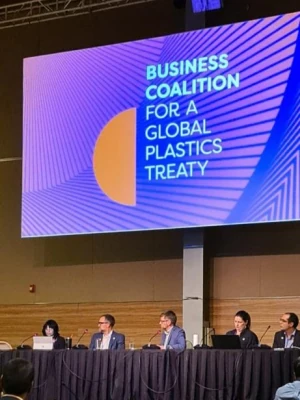
Negotiations on a UN treaty on plastic pollution kicked off this week in Uruguay.
As the voice of global business, ICC was in Punta del Este to participate in the multi-stakeholder and regional consultations aimed at developing a global treaty to eliminate plastic waste upstream during production and downstream during waste management. In our statement, we called for an ambitious legally binding instrument to help guide businesses to become positive actors in transitioning to a circular economy for plastics. We also urged all countries to seize the opportunity to work with the private sector to establish an inclusive, efficient and effective negotiating process to tackle the common goal of ending plastic pollution.
Before a report was built around several real-life case studies – developed by a series of stakeholder consultations with ICC’s global business networks over the past years – which illustrate the complexities and delays that businesses face in implementing circular approaches throughout their value-chains. In this connection, the analysis shows how: